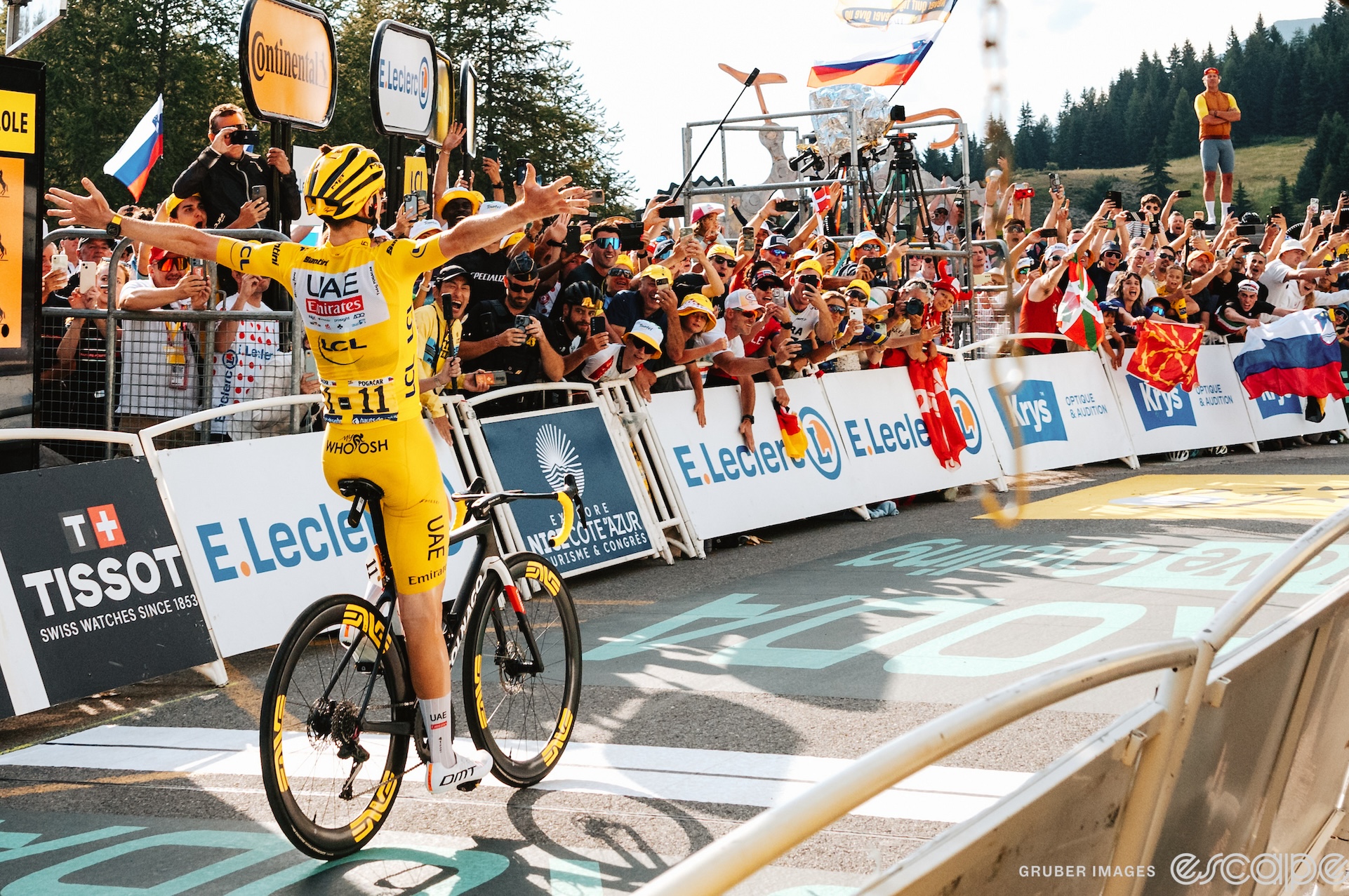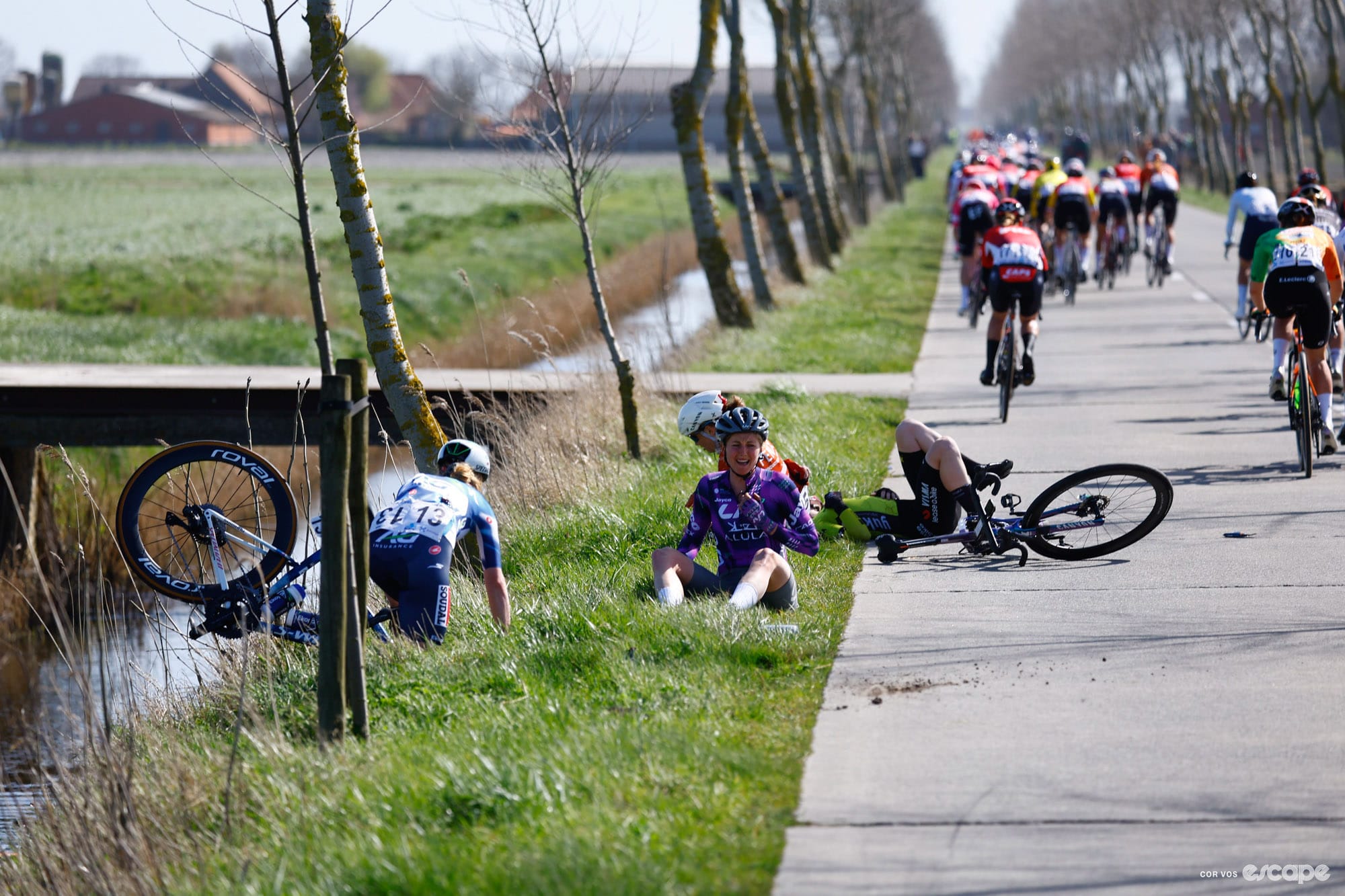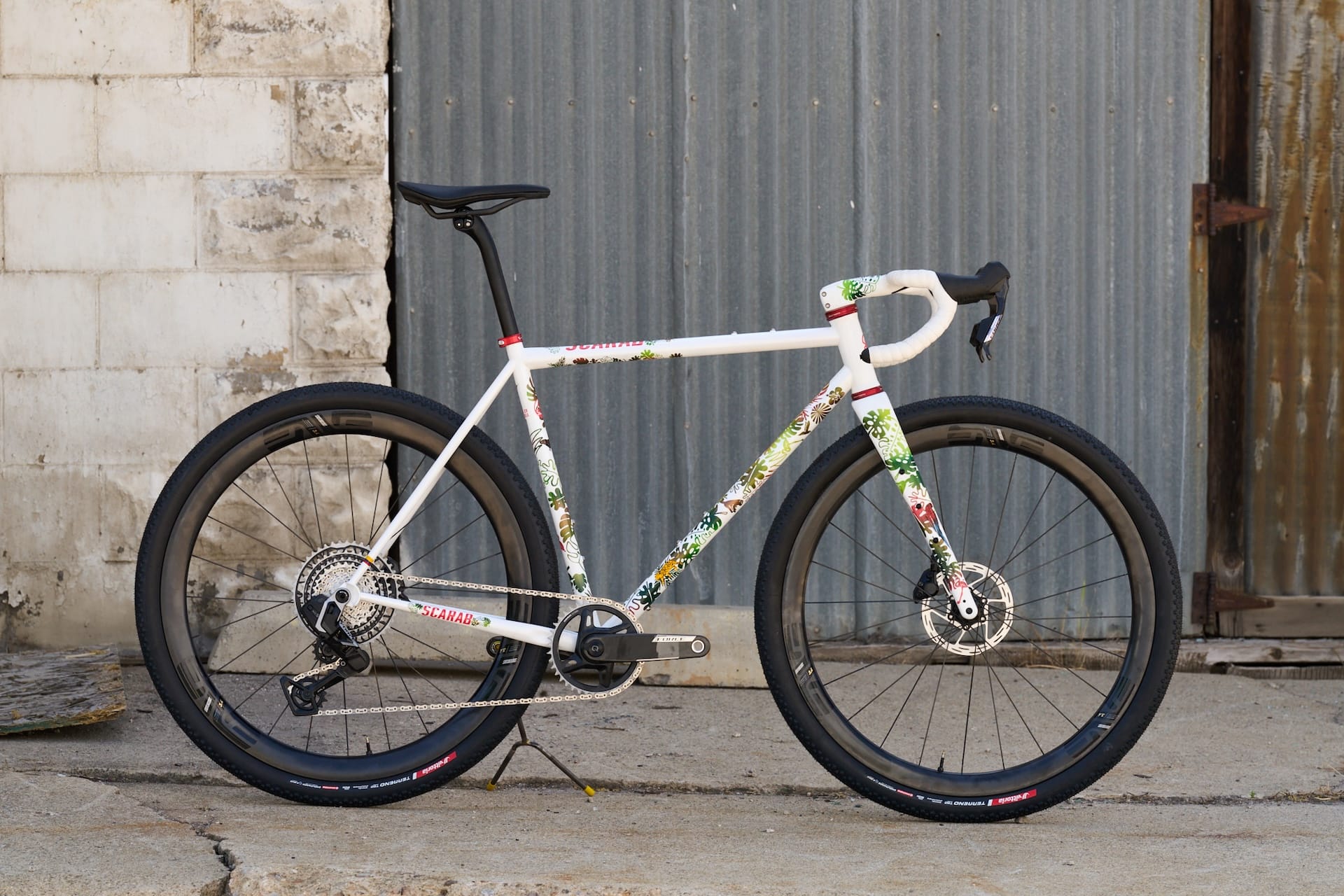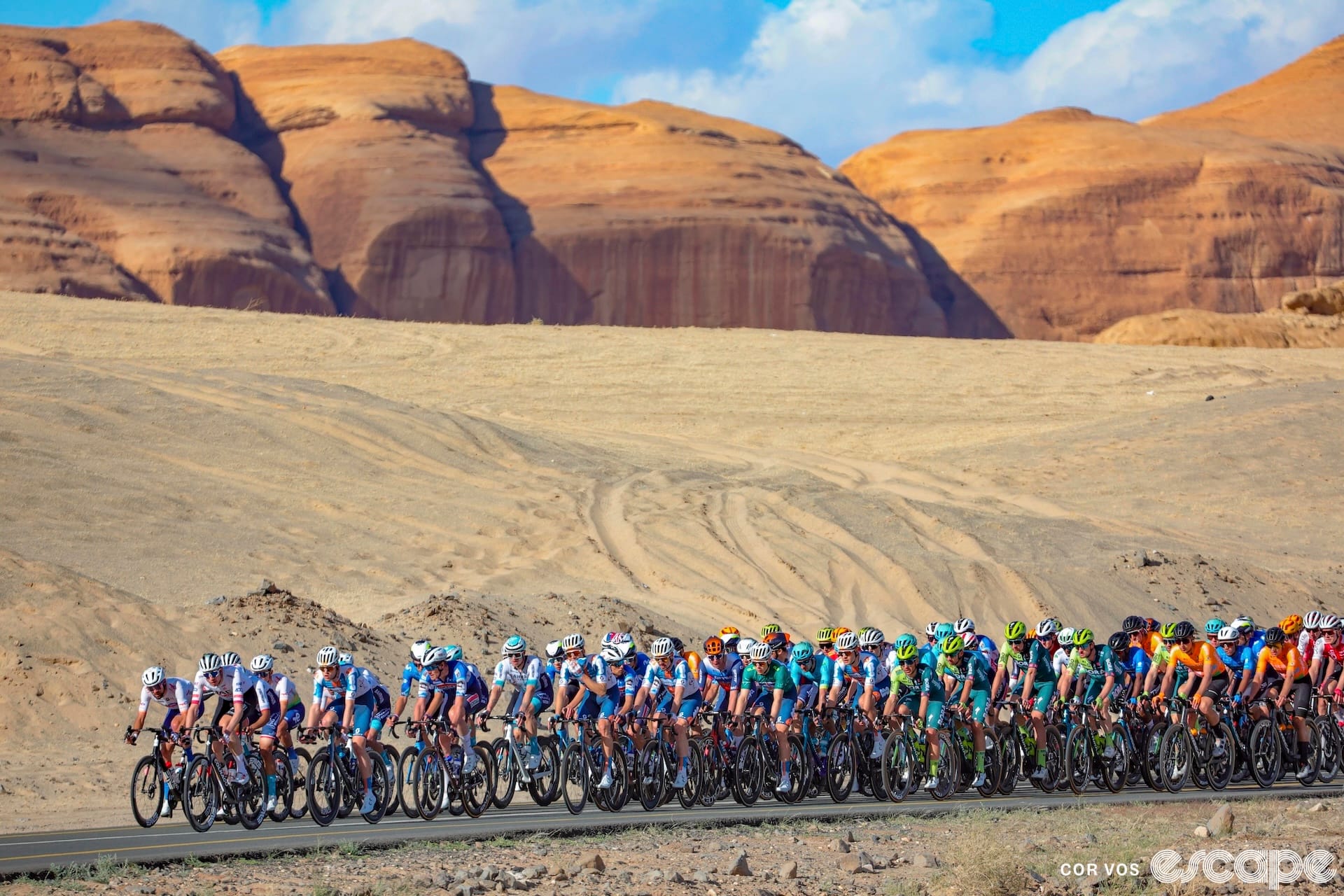One of the most consistent human behaviors is, when presented with a series of discrete events, to forge them together into a narrative. Evolution gave us a pattern-recognizing brain in order to better hunt for food and we have since used it to watch professional cycling. Fortunately for that pattern-recognizing brain, the Tour de France, with its 21 days of racing, allows for a staggering number of individual narratives at various temporal scales to be formed and clung to.
Sometimes, such as with the emotional wins of Romain Bardet and Victor Campenaerts, these narratives are years – entire careers – in the making. Sometimes, as in the case of Matteo Jorgenson’s failed breakaway on Isola 2000, a man is merely the hero of his particular moment, which, of course, creates an open pathway for a later ending with the potential for closure.
And sometimes, as in the case of Mark Cavendish’s world record 35th stage win or the sight of the green jersey on the shoulders of Biniam Girmay, the first ever Black Tour de France stage and jersey winner, they form distinct markers against which the whole of sporting history will be measured.
When it comes to understanding Tadej Pogačar, the indomitable victor of this Tour de France, it is hard not to try and reckon with his role within a broader, ongoing saga that’s spanned the last six or so years of cycling history. In many ways, cycling narrative in the long form is often an extrapolation of cycling narrative in its shortest day to day, moment to moment form.
That form is very specific. On any given day, in any given scenario, viewers form, according to previously accumulated knowledge, one of the most simple and meaningful narrative conditions: that of the underdog versus the powerful. Many other variations – the younger generation vs the old, the older generation vs the young, the breakaway vs the peloton, one rider’s revenge in the face of his defeat by another – in some way derive from this form.
This story, with its Biblical roots in David and Goliath, is based on the understanding that in cycling there are winners who are more deserving of victory not because they are clearly the strongest and most agile – a meritocratic ideal – but because they are less powerful, must work harder; because the odds are against them and because in this life, frankly, the odds are against most of us, we invest the underdog with our hope that the ordinary can persevere against extraordinary forces. When Romain Bardet, for example, was in the midst of outrunning the relentless pursuit of the peloton on that very first stage, I and countless others conjured up everything that was good, interesting, and worthy in him. Should he have lost, these qualities would have made him, in a sense, the “moral winner.”
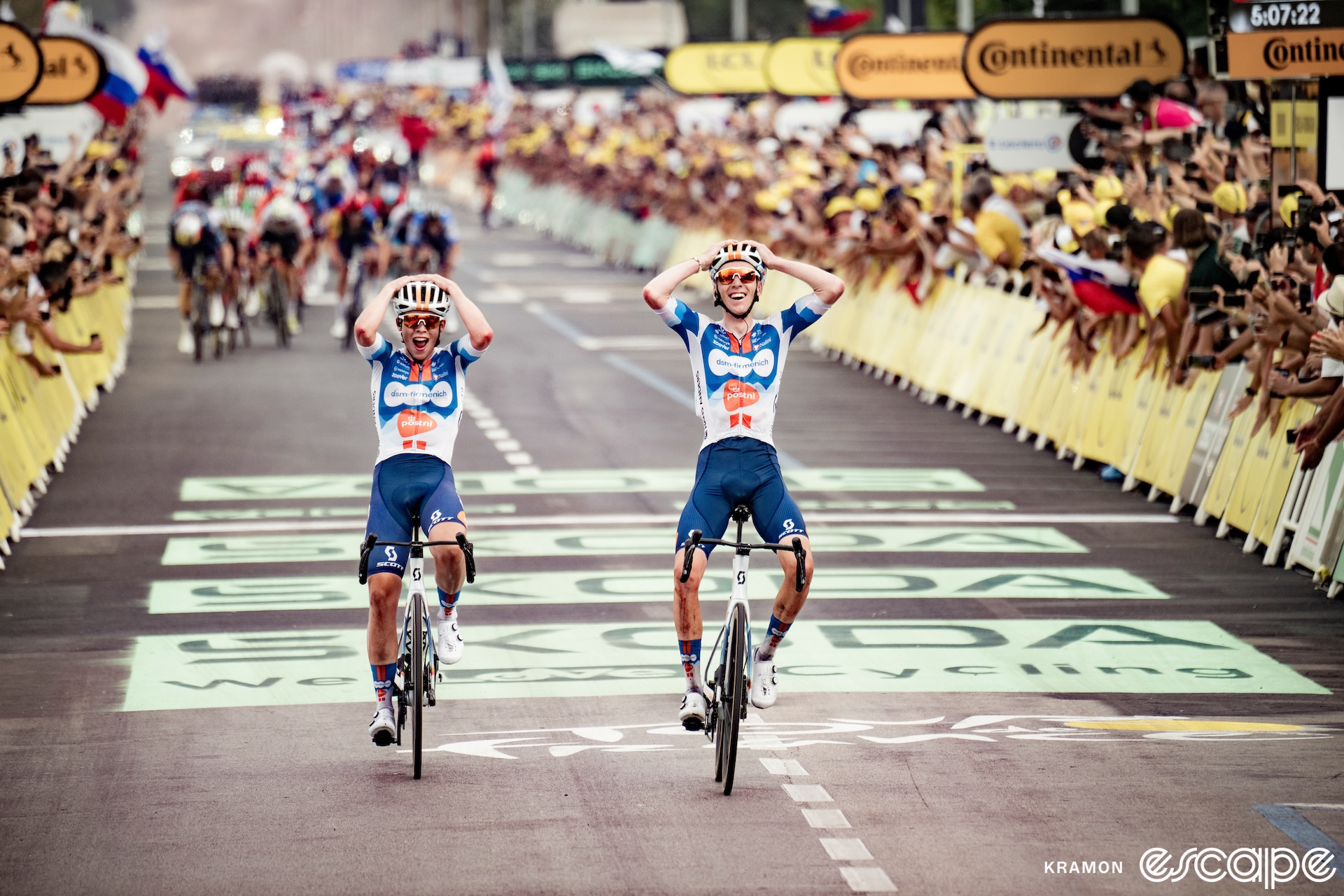
We remember as many losers in cycling as we do victors. Winner and loser form an impossible dialectic of righteousness. The sport is driven as much by the righteousness of having overcome one’s suffering and toil as it is by a deeply-held chivalric righteousness of noble loss. Implicit in this dichotomy is the need to invent, from the stuff of a complex human being, a villain. Hence, a cyclical epic of protagonists and antagonists is formed, supporting casts are assembled, and because stories are subjective, arguments are made between fans as to who is the real main character, who is the real enemy, who has become too arrogant or greedy, who is suspicious and who is not, and who will perhaps, to the relief of all, upset the balance of power, and these considerations are weighed on the basic scale of justice.
With this in mind, the last several years of Grand Tour cycling (one-day racing has unfolded differently) since at least 2018, have, in my opinion, followed a remarkably consistent and cyclical narrative arc. This arc is broadly defined as: (initial ascendency), domination, humiliation, resiliency, redemption -> domination, humiliation, resiliency, redemption, etc. as the cycle repeats. These stages are not always distinct, in fact they often elide or overlap with one another sometimes even within the same race. But because these patterns have played out before, when they play out again we expect certain elements to fall into place, and I think this explains popular attitudes towards certain riders at certain times.
I know I sound like a crank here, so let me elaborate by example. Readers who are new to the sport – perhaps you, like many of my friends, were introduced to it via the Unchained Netflix series – may not remember the late 2010s when Primož Roglič, as though out of nowhere, put then-LottoNL Jumbo on the map. Jumbo was a flagging team that emerged after the collapse of Rabobank, one of the oldest teams in cycling and a casualty of the general reckoning that rocked the sport after WADA released its final ruling against Lance Armstrong in 2012.
Roglič, famously an ex-ski jumper who came to cycling relatively late in athletic life, took a few years to acclimate to life in the peloton. (Some would say, due to his penchant for crashing, he never completely succeeded in this.) But in 2018 he burst onto the scene in full force, winning Itzulia Basque Country, Tour de Romandie, the Tour of Slovenia, and placing 4th on the general classification at the Tour de France. In 2019, he won the GC of every stage race – including the Vuelta a España – he participated in with the exception of the Giro d’Italia, where he finished 3rd.
In 2020, it was almost certain that Primož Roglič would win the Tour de France, until, famously, he didn’t. He was upset in the final time trial on La Planche des Belles Filles by none other than the still very young Tadej Pogačar. Roglič was considered, before this humiliating loss, unstoppable, utterly dominant. Outside of Slovenia, where he immediately became a national hero, Roglič, taciturn and serious, was not exactly well-liked. One journalist at L’Equipe famously compared his disposition to that of a refrigerator. (The language barrier didn’t help.)
But all that changed once Roglič’s devastation was broadcast in real time to millions of people, where, for the very first time, we saw his closely-guarded pain. The shocking defeat humanized him and after, Roglič himself opened up a bit, allowed the world to see more of his eccentric personality, his penchant for sarcastic wit. That same year, Roglič then, as he has many times since, dug in, and proved his sheer penchant for perseverance by winning the Vuelta again for a second time. While the other three parts of the narrative cycle (humiliation, resiliency, redemption) repeatedly play out in his life, Roglič would never again be the dominant player in cycling. Since that 2020 defeat, he has yet to finish a Tour de France.
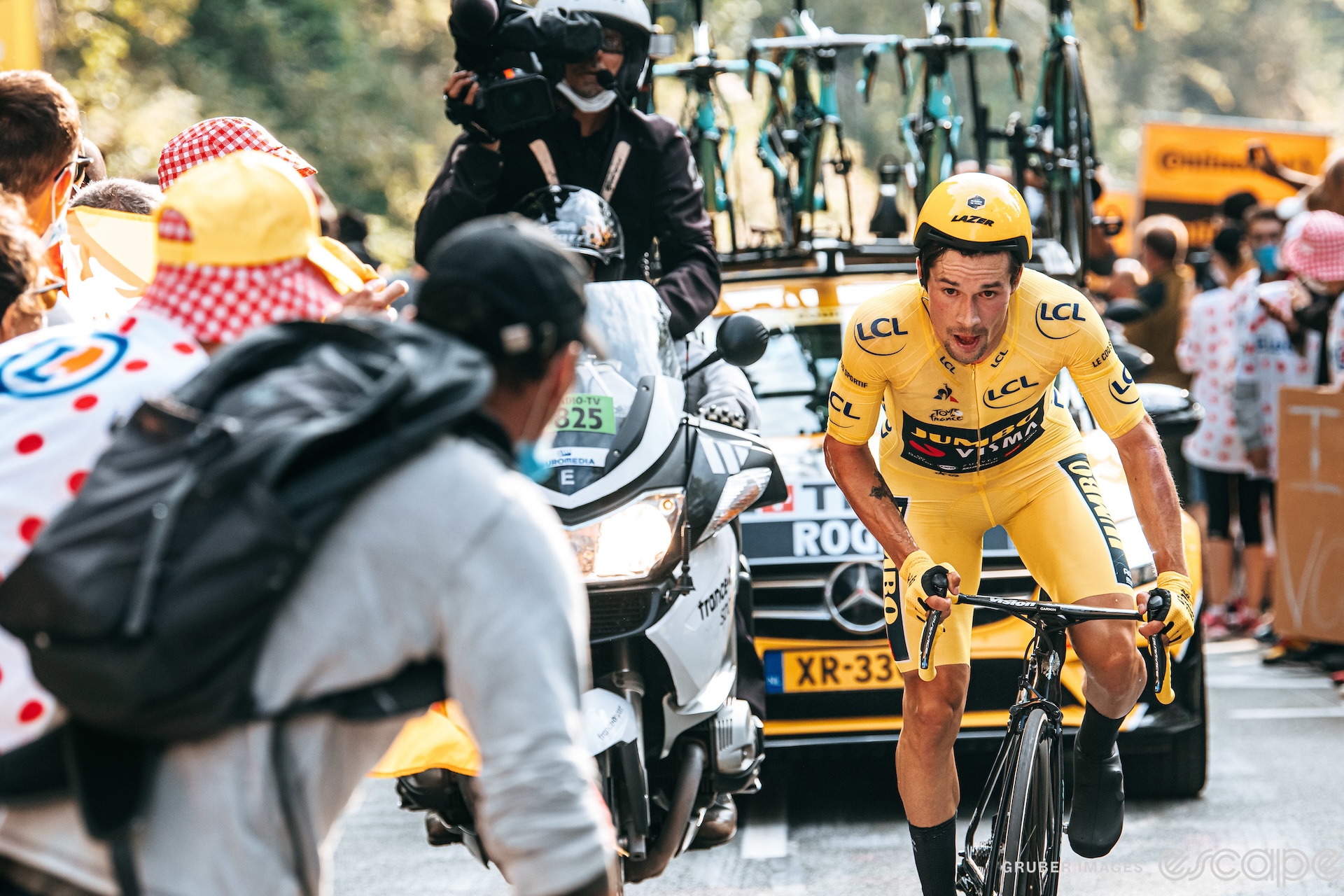
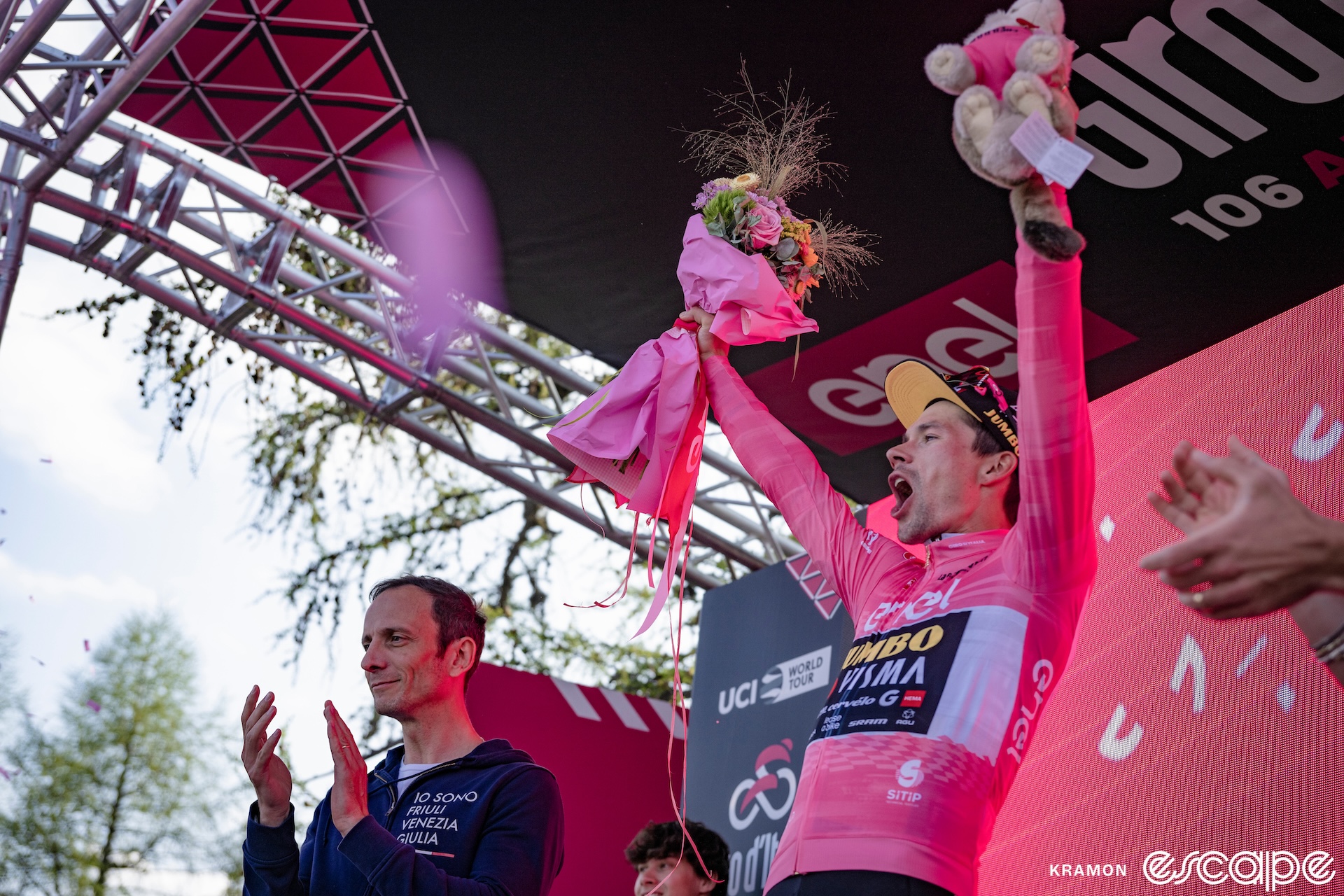
The torch had been passed. Roglič’s arc elided with that of Tadej Pogačar, who was ascendent at the time Roglič was dominant. Pogačar won the Tour de France again in 2021. He dominated the one-week stage races and the hilly classics. People initially didn’t know what to make of Pogačar either. The most obvious thing about him was that he was extremely young – he turned 21 shortly after his first Tour win – and for a long time, he was rather shy. After his second Tour win, he began to open up somewhat, showed more of his personality, his sociality, distinguished from others by his playfulness.
However, having worked with Pogačar on two long profiles, I walked away with a different impression of him: that his goals of becoming the best cyclist in the world were not banter, that he was, beneath this youthful image, pensive and deeply serious. He is dedicated to cycling for what it is, cycling in itself, and his dedication is fueled by love on the one hand and an explicitly competitive spirit on the other. He contemplates himself in historical terms that are far larger than those of individual seasons or races. Part of the reason he works so extensively with youth cyclists in his home country is because (though he wouldn’t put it this way) he sees cycling itself as a continuously unfolding historical phenomenon. He wants to achieve as much as possible while his own story is the one unfolding.
However, much like Roglič, Pogačar would not become as well-liked by the public until he lost the 2022 Tour to the prior year’s runner-up, a man then still broadly considered not on his own terms but as Roglič’s teammate – Jonas Vingegaard. It’s a necessary rite of passage: A rider needs to lose hugely before he can become broadly liked. It is through losing, perhaps, that he becomes imperfect, nuanced, and therefore believable as a character with raised stakes. It’s my retrospective view that Pogačar’s dominance was somewhat tolerated not only because it straddled all disciplines of road cycling, making it unique, and not only because of his pleasant personality but because he lost the Tour, once, then twice. Because the value of the Tour is bigger than the value of other races, and let’s not pretend it isn’t, it was seen to balance out all those other victories. Per the cycle, the losses made him resilient, he dominated again, etc.
Pogačar’s dominance elided almost perfectly with Vingegaard’s ascendancy. If Pogačar is best understood as an exceptional individual (UAE Team Emirates, to this day, is not without tactical controversy), Vingegaard’s story is very much wrapped up in that of Visma Lease-a-Bike, which was, since 2018 and through their triple-Grand-Tour sweep last year – including a 1-2-3 podium at the Vuelta – the best cycling team in the world. Pogačar’s two Tour wins in 2020 and 2021 were an exception to Visma Lease-a-Bike’s complete and utter control over stage racing, which, by the end of last year, was celebrated by some fans but caused public fatigue and discomfort in others, including this journalist.

Vingegaard couldn’t be more different from his rival. He’s psychologically closed off, elusive, and quiet, forgoing the public in favor of a highly private life with his young family. He hides pain well because pain is also an emotion. Like Roglič, he is described as cold and robotic, but unlike Roglič, Vingegaard does not have a movie-magic story and is not particularly eccentric. Per our narrative cycle, this Tour, in which Vingegaard lost a whopping five minutes to Pogačar (thus completing his own arc of Tour redemption), has established an expectation that Vingegaard, too, will be “humanized” by it. That he will melt before us, that he will reveal himself to us, that he will be made whole as a protagonist because he is now flawed. His team, whose dominance came at the cost of the departure of Primož Roglič, was thoroughly defeated.
And indeed, after days of watching Vingegaard’s relinquishment, of watching him helplessly letting Pogačar go, struggling on the sides of brutal mountains, seeking the arms of his family, of seeing his face, which did not seem cold at all but rather exhausted and almost pleading, many of the hardest hearts began to soften for him. The fact that he was able to recover from a career-threatening crash in Itzulia just three months before the Grand Depart in Florence and still push his best numbers of all time invites respect, only adds to the sense that, from this point of departure, Vingegaard can now enter a phase of resiliency and beyond that, redemption. It’s worth noting here that missing still from our cycle, is the subtle ascendancy of the yet-unknown rider who will come to replace our two rivals and will thus carry the years-long arc of this cycle to its final closure.
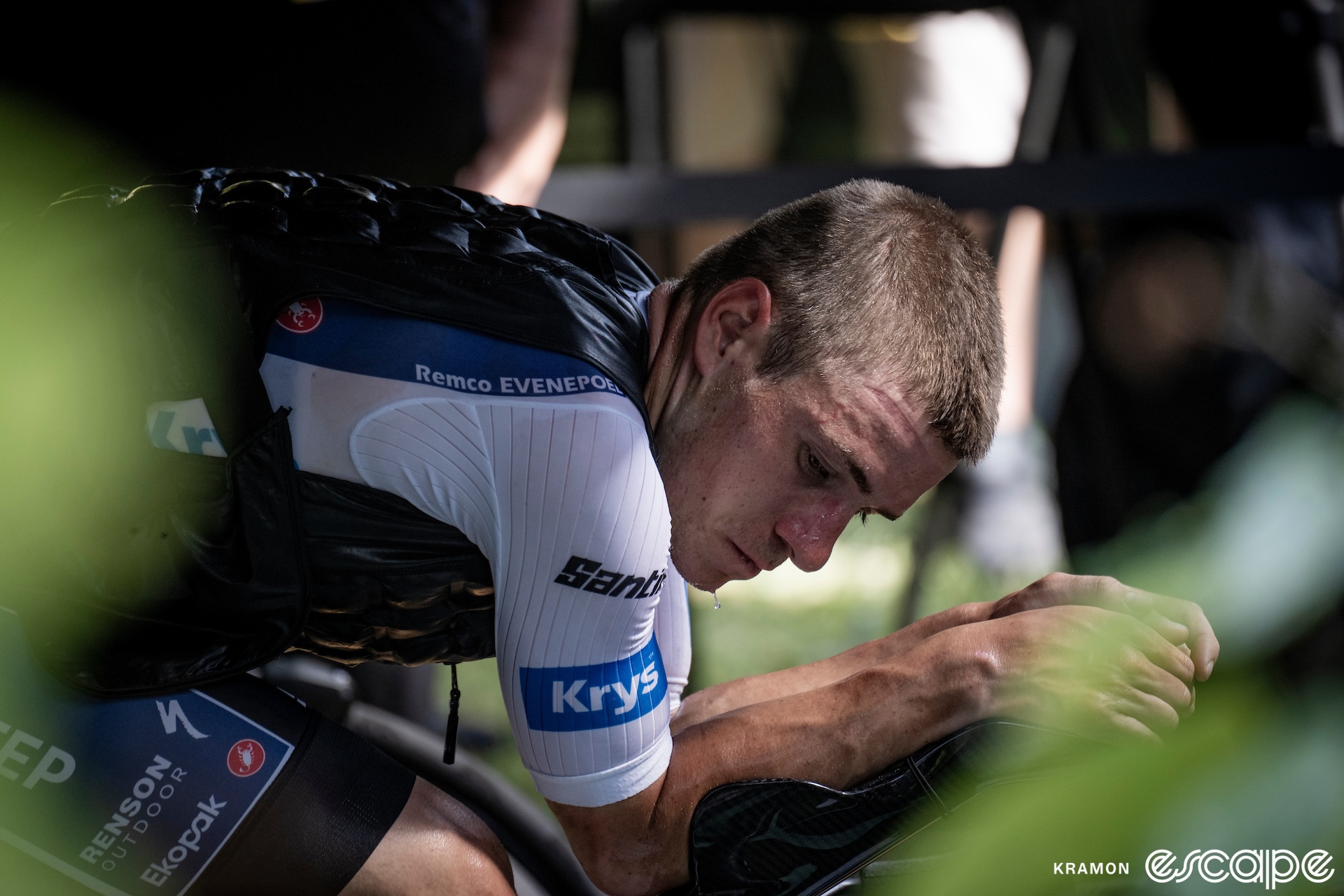
It is now Pogačar who is, once again, in the driver’s seat of dominance. The dominance he displayed in this Tour was so totalizing it is statistically dizzying and, for the more skeptical among us, hard to reckon with. Joe Lindsey has tackled questions of the performance’s believability well in these same pages, and so on that count, I defer to him. And while those questions remain both absolutely valid and unfortunately unanswered, that’s not to say that Pogačar’s win was itself without controversy. For three weeks, he was hit with alleged leaks about his training and general court intrigue in the house of UAE Team Emirates, inquiries at press conferences about carbon monoxide rebreathers after Escape Collective broke the news about their use in teams, and plenty of public discourse about whether or not he was perhaps a bit too selfish.
The tide is subtly turning against our victor, the cycle is shifting again. The word "merciless" was readily thrown around in group chats and conversations I’ve been in, but I don’t think it’s the right one at all. I don’t believe that mercy has ever been a factor in cycling and I think its absence is what gives the sport its specific, cruel gravitas. A better choice would be relentless. Pogačar, from day one of this Tour, did not relent, and there were many times – Isola 2000, Col de la Couillole – when he could have, if only to spare himself the exertion. For him, all of these perplexing efforts are very simple to understand: cycling is about winning and doing it as much as possible, whenever the opportunity arises, or whenever the opportunity can be engineered.
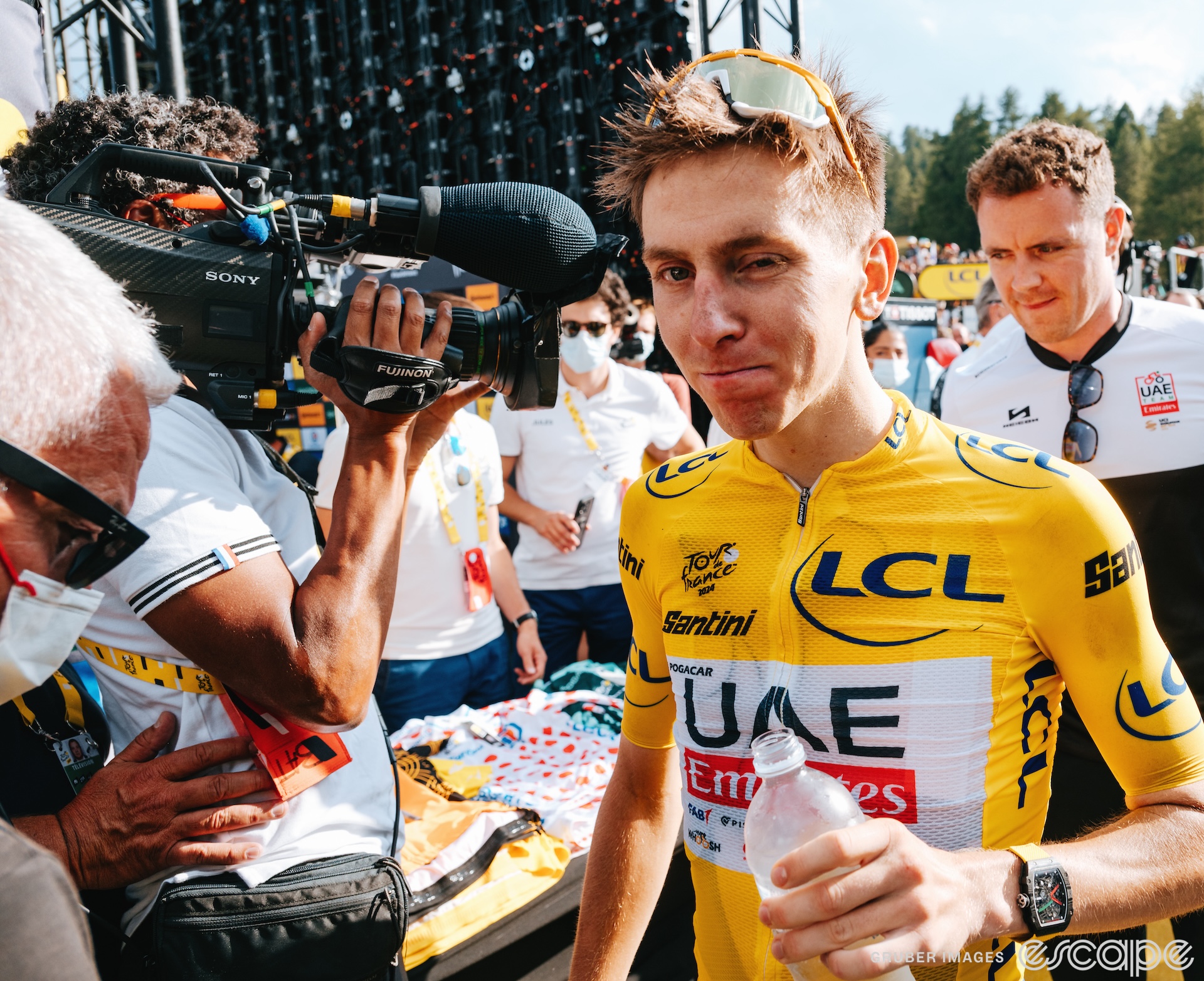
While Pogačar’s personality goes a long way in making him likable, I think it is safe to say he is no longer the obligatory sympathetic character, no longer the designated long-term Tour underdog. At twenty-five, he has fully come of age and eschews all presumptions of boyishness. He has outgrown the permissiveness we so often give to the young. In 2020, Pogačar showed the world that nothing would stop him. Now, we have every right to believe him. What this means for him and his public perception going forward is too soon to tell. We may not know until next year. We may not know until the end of the decade. Right now all we can do is watch.
Did we do a good job with this story?

